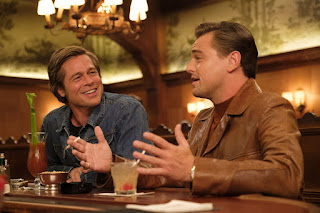Tarantino Reminisces on Hollywood's Golden Age, but his Ninth Feature is More of a Slog than a Walk Down Memory Lane
When
first watching Tarantino's ninth feature film, it is immediately
apparent that this is his celebration of cinema, specifically the way
that cinema, and Hollywood, used to be. Once Upon a
Time...In Hollywood takes place
in 1969, right at the end of what is considered Hollywood's 'Golden
Age'. Leonardo DiCaprio and Brad Pitt star as Rick Dalton and Cliff
Booth. Dalton is an actor famous for playing the lead in a cancelled
TV Western, and Cliff is his stunt-man turned driver who also happens
to be his closest friend. Rick finds himself increasingly cast in the
villain roles, being beaten time and again by up-and-coming stars.
Fearing irrelevance, Rick clings to his star status and desperately
tries to maintain it. The film also follows young actress Sharon Tate
(Margot Robbie) and explores the lives and changing careers of these
individuals as the film industry changes alongside them.
Rick
and Cliff may not be altogether likeable characters (Rick is full of
self-pity; Cliff is rumoured to have murdered his wife) but DiCaprio
and Pitt are astoundingly good in their roles. Their chemistry is
excellent and they perfectly embody two down-on-their-luck buddies
who are struggling against what feels like inevitable change. Early
on we get a good sense of how exciting Rick's career has been. There
are plenty of flashbacks to the variety of roles that he has acted
in, and these prove to be fun little film scenes within the film
itself where Tarantino plays around with different genres. However it
feels at times like the sheer volume of flashbacks, and the length of
them, slow the film down. Often the plot is lost amongst long and
unwieldy scenes from the characters' pasts. The story in general
tends to wander around, never staying in one place for long. And it
never seems to reach a satisfactory destination either, with the film
ending in an unexpected and slightly anti-climactic way. Despite the
lack of a focused plot there are some truly hilarious moments. It's
just a shame that they're hidden amongst so much filler.
At
the start of the film, Rick and Al Pacino's character Mr Schwarz
discuss what they love about the movies, the latter stating that he
enjoys all of the killing and gratuitous violence. Tarantino seems to
be expressing his own opinion here; he is, after all, known for his
incredibly violent films. However, whatever
he seems to be promising with this line never really gets delivered.
In fact, this film is surprisingly tame until the closing moments.
And whilst the promised violence is delivered in these scenes it
feels distinctly as though Tarantino has almost withheld this most
recognisable aspect of his filmmaking.
Whilst
Rick and Mr Schwarz discuss their love of film, it's also clear that
this is a demonstration of the director's own love of cinema. Often
the film feels less about the characters as individuals, and more
about their place in Hollywood and the film industry. The film opens
with an old interview with Rick and Cliff and a trailer for Rick's
cancelled TV show. The locations are either film sets, or houses that
are riddled with movie posters, and the Hollywood streets that we see
so much of seem to have a cinema on every block. Overall we get a
very rose-tinted view of Hollywood at this time, and despite the fact
that sleazy aspects of the industry are featured they are generally
glossed over and treated with a kind of indifference. The focus
instead is placed on the joys that cinema can bring and Rick and
Sharon's dreams of 'making it' in Hollywood.
I
haven't yet mentioned Robbie's portrayal of Sharon Tate, and that is
largely because she has little to do. It's much the same with all of
the women in this film. All are stereotypes, and whilst Robbie is
perfectly charming as Sharon the character is vapid and lifeless. The
film would greatly benefit if attention was paid to developing the
female characters instead of just paying attention to their feet. The
presence of Sharon in the film is questionable, as she simply
provides a small link to the Manson gang who play a surprisingly and
disappointingly small role in this film. You could remove almost all
of Robbie's scenes and the film would be unchanged.
This
is a disjointed and uneven film from Tarantino that feels somehow
incomplete. But it's an optimistic look at Hollywood's Golden Age and
even when the pace lags and the plot wanders, Pitt and DiCaprio's
spectacular performances hold it together.


